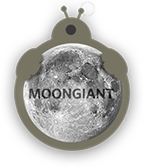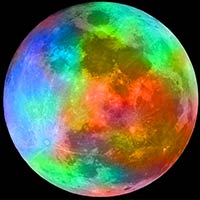
 April 20 Waxing Gibbous 98% |
 April 21 Waxing Gibbous 100% |
 Full Moon Illumination: 100% |
 April 23 Waning Gibbous 98% |
 April 24 Waning Gibbous 95% |
Moon Phase: April 22, 2016
On this day the Moon was in a Full Moon phase. The Moon will be visible throughout the night sky rising at sunset in the east and setting with the sunrise the next morning in the west. During a Full Moon the moon is 100% illuminated as seen from Earth and is on the opposite side of the Earth from the Sun. The point at which a Full Moon occurs can be measured down to a fraction of a second. The time it takes between full moons is known as a Synodic month and is 29.530587981 days long. Keep track of all the Full Moons throughout the year on the Full Moon Calendar >
Visit the April 2016 Moon Phases Calendar to see all the daily moon phase for this month.
Full Moon Phase
The Full Moon on April 22 has an illumination of 100%. This is the percentage of the Moon illuminated by the Sun. The illumination is constantly changing and can vary up to 10% a day. On April 22 the Moon is 15.17 days old. This refers to how many days it has been since the last New Moon. It takes 29.53 days for the Moon to orbit the Earth and go through the lunar cycle of all 8 Moon phases.
Today's Moon Sign: ♍ Virgo
The current zodiac moon sign is Virgo, positioned at 12.15° within the sign. The Moon entered Virgo on Loading... and will shift into Libra on Loading.... The zodiac moon sign represents the position of the Moon as it moves through the twelve signs of the zodiac. Each zodiac moon sign lasts about 2 to 2.5 days as the Moon travels through that part of the sky.
The 8 Lunar Phases
There are 8 lunar phases the Moon goes through in its 29.53 days lunar cycle. The 4 major Moon phases are Full Moon, New Moon, First Quarter and Last Quarter. Between these major phases, there are 4 minor ones: the Waxing Crescent, Waxing Gibbous, Waning Gibbous and Waning Crescent. For more info on the Moon Cycle and on each phase check out Wikipedia Lunar Phase page.
Phase Details for - April 22
Illumination: 100%
Moon Age: 15.17 days
Moon Angle: 0.49
Moon Distance: 405,115.96 km
Sun Angle: 0.53
Sun Distance: 150,431,385.84 km
Useful Moon Resources
Check the weather before a night of Moon gazing at weather.com
For a list of all the current meteor showers visit American Meteor Society
Full Moon Moonrise and Moonset


